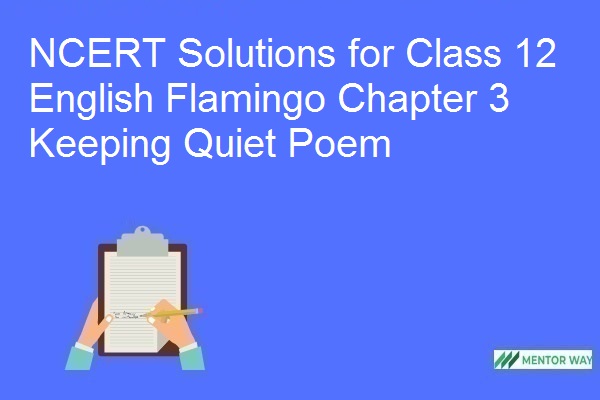NCERT Solutions for Class 12 English Flamingo Chapter 3 Keeping Quiet Poem
8 min read
NCERT Solutions for Class 12 English Flamingo Chapter 3 Keeping Quiet Poem
Class 12 English NCERT Solutions Flamingo Chapter 3 Keeping Quiet Poem Free PDF Download
NCERT Solutions for Class 12 English
Keeping Quiet Textual Questions and Answers
Question 1.
What will ‘counting up to twelve and keeping still’ help us to achieve? [Delhi 2015]
Answer:
Counting up to twelve and keeping still will help us to understand ourselves and to introspect. We will be able to realize the real impact of our selfish actions on each other and, finally, on the entire humanity.
Question 2.
Do you think the poet advocates total inactivity and death?
Answer:
The poet does not advocate ‘total inactivity’ because he has a firm belief in life. He wants everyone to live a complete life, full of peace and contentment. He wants everyone to take a break from the hectic schedule and introspect for a while to improve the quality of life.
Question 3.
What is the ‘sadness’ the poet refers to in the poem?
Answer:
The poet refers to the sadness which all human beings experience because of the lifestyle of nonstop work, stress, aggression and destruction. This sadness comes because man does not understand himself.
Question 4.
What symbol from nature does the poet invoke that there can be life under apparent stillness? [Delhi 2015. Foreign 2014]
Answer:
The poet uses ‘Earth’ as a symbol to invoke that there can be life after apparent stillness. The Earth seems ‘still’ from outside but is alive and vibrant deep within. Similarly, our silence can help us to maintain a harmonious life on Earth and stop destruction.
Keeping Quiet Solved Question Bank
Reference-to-context Exercises
Read the extracts given below.
Question 1.
Now we Will count to twelve [All India 2016]
and we will all keep still.
For once on the face of the Earth let’s not speak in any language, let’s stop for one second, and not move our arms so much.
Answer the following.
(a) The poet urges humanity to remain silent for the duration of twelve counts. (True False)
(b) By keeping still, we can count till twelve, according to the poet. (True/False)
(c) The poet wants us not to ____________ in any language.
(d) We should not move our ____________ for one second.
Answer:
(a) True
(b) False
(c) speak
(d) arms
Question 2.
It would be an exotic moment
without rush, without engines,
we would all be together
in a sudden strangeness.
Answer the following.
(a) It would be an exotic time because no engines would rush around. (True/False)
(b) The poet envisages an exotic moment of stillness which would be without ____________ .
(c) There would descend a sudden ____________ when we all get together.
(d) When there will be no engines or rush, what kind of moment would that make?
Answer:
(a) True
(b) rush
(c) strangeness
(d) exotic
Question 3.
Fishermen in the cold sea
would not harm whales
and the man gathering salt
would look at his hurt hands.
Answer the following.
(a) Fishermen in the cold seas are hurt by whales. (True/False)
(b) The salt gatherers will examine the destruction their trade has done to their hands. (True/False)
(c) Fishermen hunt ____________ in cold seas.
(d) ____________ are affected by salt gatherers.
Answer:
(a) False
(b) True
(c) whales
(d) Hands
Question 4.
Those who prepare green wars, wars with gas, wars with fire, victory with no survivors, would put on clean clothes and walk about with their brothers…
Answer the following.
(a) Fighting a green war leads to a victory with, all survivors. (True/False)
(b) Wars using gas and fire as weapons, are wars with no survivors. (True/False)
(c) Who would wear clean clothes in case there was a silence on the war front?
(d) With whom would these ex-warriors walk?
Answer:
(a) False
(b) True
(c) fighters
(d) brothers
Question 5.
…perhaps a huge silence [Foreign 2016]
might interrupt this sadness
of never understanding ourselves
and of threatening ourselves with
death.
Answer the following.
(a) Silence will help us understand ourselves. (True/False)
(b) Human beings are currently threatening us with death. (True/False)
(c) What follows due to not understanding one another?
(d) In a noisy world we do not ____________ oursel
Answer:
(a) True
(b) True
(c) sadness
(d) understand
Question 6.
In the shade, doing nothing.
What I want should not be
confused
with total inactivity.
Life is what it is about;
I want no truck with death.
If we were not so single-minded about keeping our lives moving, and for once could do nothing, perhaps a huge silence might interrupt this sadness Of never understanding ourselves and of threatening ourselves with death.
Answer the following.
(a) According to the poet doing nothing is not to be confused with total inactivity. (True/False)
(b) Our single-minded concern is to keep our lives moving. (iVue/Faise)
(c) If we did nothing, a huge silence would ____________ the sadness of our current world.
(d) By our constant activity what destruction are human beings bringing upon themselves?
Answer:
(a) True
(b) True
(c) interrupt
(d) death
Question 7.
Perhaps the Earth can teach us
as when everything seems dead
and later proves to be alive.
Now I’ll count up to twelve
and you keep quiet and I will go.
Answer the following.
(a) The poet is counting up to twelve, so that we can hide from him. (True/False)
(b) The Earth teaches us to be outwardly silent and inwardly productive. (True/False)
(c) By keeping quiet we may appear outwardly to be ____________ .
(d) The ____________ can teach us to be introspective
Answer:
(a) False
(b) True
(c) dead
(d) Earth
Keeping Quiet Short Questions and Answers
Question 1.
‘Life is what it is all about.’ How is Keeping Quiet related to life? [All India 2015|
Answer:
‘Keeping Quiet’ is related to life because, in order to live a complete life, one must live life to its fullest. In order to live quality life, which is full of happiness, peace, and satisfaction, we must develop a habit of thinking deeply and this can be achieved through introspection.
Question 2.
Why does one feel a sudden strangeness on counting to twelve and keeping quiet? [All India 2015]
Answer:
When one keeps quiet and stops all his selfish actions and takes a break from the monotonous routine, one gets time to introspect and analyze one’s actions. This brings a feeling of sudden strangeness because we never take a break from hectic activity and continuous talk.
Question 3.
How will keeping quiet protect our environment? [All India 2015]
Answer:
Keeping quiet refers to stopping all activities for a moment and introspect. This will help us to analyze the kind of deeds we are doing for our selfish purpose but which harm nature. This moment will make us understand the fact that harmony with nature is very essential for the survival of mankind.
Question 4.
What will possibly be the effect of ‘keeping quiet’? [All India 2015]
Answer:
Keeping quiet will result in a mutual understanding among all human beings and understanding ourselves. We will be able to understand the fact that the balance between nature and human beings is essential for our existence on the Earth.
Question 5.
Which is the exotic moment that the poet refers to in ‘Keeping Quiet’? |Ddhi 2014]
Answer:
The poet refers to the exotic moment when everyone would be silent and still and there would be no noise or mad race. It will evoke an environment of peace and quietness with no conflicts, quarrels, agreements or wars. This moment will bring a sense of togetherness among all human beings.
Question 6.
How can keeping quiet change our attitude to life? [Delhi 2013 (C)]
Answer:
If we keep quiet for a moment to introspect and cease our selfish and destructive actions, it will lead to our understanding ourselves and may change our attitude.
Question 7.
Which images in the poem ‘Keeping Quiet’ show that the poet condemns violence? [All India 2014 (C)]
Answer:
Pablo Naruda gives the images of ‘green war’, ‘war with gas’, and ‘wars with fire’ and then associates these wars with ‘victory with no survivors’. This is to emphasise the fact that wars will bring an end to the entire human race. This shows that he condemns violence.
Question 8.
What are the different types of wars mentioned in the poem? What is Neruda’s attitude towards them? [All India 2013]
Answer:
Pablo Neruda has mentioned ‘green wars’, ‘wars with fire’ and ‘wars with gas’. The poet does not appreciate the concept of war. He condemns it by saying that these wars will result in victory with no survivors. So instead of these wars and conflicts, we must develop the concept of mutual understanding and co-existence.
Question 9.
How can suspension of activities help? [All India 2012]
Answer:
The suspension of activities will help us to introspect. It will provide an insight into the mad rush
and selfish actions we indulge in. When we all are able to ponder and analyze our own actions and attitude, we will develop mutual understanding and realise the importance of co-existence.
Question 10.
Why is Pablo Neruda against total inactivity?
Answer:
The poet is against total inactivity because it means death, whereas the poet has firm belief in life. He only wishes us to introspect and take a break from the hectic, aimless life.
Question 11.
What does the poet want all the perpetrators of war to do?
Answer:
The poet wants them to make their conscience clean from the envy and selfish motives. They should stop fighting and develop an understanding of peace among the human beings.
Question 12.
What will be the ultimate end of man if the present scenario of wars and conflicts continues?
Answer:
If the present scenario of war and destruction continues, it will lead to total destruction of the humanity. We all will perish and nobody will be left to celebrate the victory.
Question 13.
How our state of mind will be changed if we maintain silence and suspend activity for a while?
Answer:
The poet believes that if we all stop for a moment to introspect and realize the impact of our actions, then we will be able to understand the need to be together and develop a mutual understanding for the survival on earth. This realization will bring a change in our state of mind and our attitude towards each other.
Question 14.
How would keeping quiet affect life in and around the sea? [All India 2017]
Answer:
Keeping quiet would affect life in and around the sea as the fishermen would not be killing the whales and the men gathering salt would give rest to their injured hands.
Question 15.
How is the Earth a source of life when all seems dead on it? [All India 2017]
Answer:
When all seems dead on the earth, it is not really quiet. It seems calm but in reality, it is nurturing life underneath.
Question 16.
How is total inactivity on the Earth in the winter months full of life? [All India 2017]
Answer:
In winter months one finds total inactivity in nature. But the poet does not advocate total inactivity. He feels quietude of winter months is ripe with the hope for a peaceful world.
Question 17.
According to Pablo Neruda, how would keeping quiet be an exotic moment? [Foreign 2017]
Answer:
The poet feels that the moment of silence would be an exotic moment because if would be an instance of universal brotherhood, peace, and harmony. In that moment all of us would initiate introspection through meditation and the whole world would be shrouded in quietness.
Question 18.
What are green wars? Who wage them and with what result? [Foreign 2017]
Answer:
Green wars imply waging a was against nature by causing environmental degradation.
People wage war against nature for their self-interest. All wars originate from the lack of self-understanding.
Question 19.
According to Pablo Neruda, what do we not do when we keep quiet? [Foreign 2017]
Answer:
According to Pablo Neruda, when we keep quiet all of us should not talk in any language nor should we involve in any kind of physical activity to disturb the calm. The pause in our’mundane activity would suspend all our woes.



